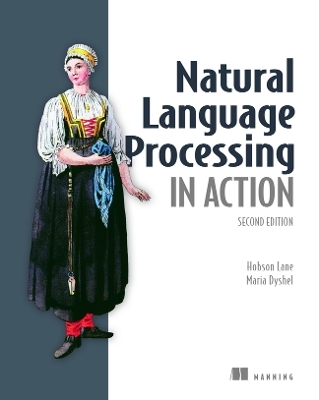
Natural Language Processing in Action
Manning Publications (Verlag)
978-1-61729-944-5 (ISBN)
- Noch nicht erschienen (ca. März 2025)
- Versandkostenfrei innerhalb Deutschlands
- Auch auf Rechnung
- Verfügbarkeit in der Filiale vor Ort prüfen
- Artikel merken
In Natural Language Processing in Action, Second Edition you will learn how to:
Process, analyze, understand, and generate natural language text
Build production-quality NLP pipelines with spaCy
Build neural networks for NLP using Pytorch
BERT and GPT transformers for English composition, writing code, and even organizing your thoughts
Create chatbots and other conversational AI agents
Natural Language Processing in Action has helped thousands of data scientists build machines that understand human language. In this new and revised edition, you'll discover state-of-the art NLP models like BERT and HuggingFace transformers, popular open-source frameworks for chatbots, and more. As you go, you'll create projects that can detect fake news, filter spam, and even answer your questions, all built with Python and its ecosystem of data tools. about the technology Deep learning has been a giant leap forward for NLP applications. Developers can now build chatbots and other natural language tools that can imitate real people, diagnose illness, automatically summarize documents, and more. Accessible open source tools such as spaCy and PyTorch make production-level NLP easier and more impactful than ever before. about the book Natural Language Processing in Action, Second Edition is your guide to building software that can read and interpret human language. This new edition is updated to include the latest Python packages and comes with full coverage of cutting-edge models like BERT, GPT-J and HuggingFace transformers.
In it, you'll learn to create fun and useful NLP applications such as semantic search engines that are even better than Google, chatbots that can help you write a book, and a multilingual translation program. Soon, you'll be ready to start tackling real-world problems with NLP. AUTHOR BIO Hobson Lane is a data scientist and machine learning engineer. He has over twenty years experience building autonomous systems and NLP pipelines for both large corporations and start-ups. Currently, Hobson is an instructor at UCSD Extension and Springboard, and the CTO and cofounder of Tangible AI and ProAI.org. Maria Dyshel is a social entrepreneur and artificial intelligence expert. She held a variety of AI research, engineering, and management roles in diverse industries, from designing and improving algorithms for autonomous vehicles, to implementing company-wide Conversational AI program in one of the world's largest pharma companies. Maria is currently the CEO and cofounder of Tangible AI. Cole Howard and Hannes Max Hapke were authors of the first edition of Natural Language Processing in Action and their legacy lives on in the collective intelligence of the community around the book.
Hobson Lane is a data scientist and machine learning engineer. He has over twenty years experience building autonomous systems and NLP pipelines for both large corporations and start-ups. Currently, Hobson is an instructor at UCSD Extension and Springboard, and the CTO and cofounder of Tangible AI and ProAI.org. Maria Dyshel is a social entrepreneur and artificial intelligence expert. She held a variety of AI research, engineering, and management roles in diverse industries, from designing and improving algorithms for autonomous vehicles, to implementing company-wide Conversational AI program in one of the world's largest pharma companies. Maria is currently the CEO and cofounder of Tangible AI. Cole Howard and Hannes Max Hapke were authors of the first edition of Natural Language Processing in Action and their legacy lives on in the collective intelligence of the community around the book.
table of contents PART 1: WORDY MACHINES (VECTOR MODELS OF NATURAL LANGUAGE) READ IN LIVEBOOK 1MACHINES THAT READ AND WRITE (NLP OVERVIEW) READ IN LIVEBOOK 2TOKENS OF THOUGHT (NATURAL LANGUAGE WORDS) READ IN LIVEBOOK 3MATH WITH WORDS (TF-IDF VECTORS) READ IN LIVEBOOK 4FINDING MEANING IN WORD COUNTS (SEMANTIC ANALYSIS) PART 2: DEEPER LEARNING (NEURAL NETWORKS) 5 BABY STEPS WITH NEURAL NETWORKS (PERCEPTRONS AND BACKPROPAGATION) 6 REASONING WITH WORD VECTORS (WORD2VEC) 7 GETTING WORDS IN ORDER WITH CONVOLUTIONAL NEURAL NETWORKS (CNNS) 8 LOOPY (RECURRENT) NEURAL NETWORKS (RNNS) 9 IMPROVING RETENTION WITH LONG SHORT-TERM MEMORY NETWORKS (LSTMS) 10 SEQUENCE TO SEQUENCE MODELS AND ATTENTION (GENERATIVE MODELS) PART 3: GETTING REAL (REAL WORLD NLP CHALLENGES) 11 INFORMATION EXTRACTION (NAMED ENTITY EXTRACTION AND QUESTION ANSWERING) 12 GETTING CHATTY (DIALOG ENGINES) 13 SCALING UP (OPTIMIZATION, PARALLELIZATION AND BATCH POCESSING) APPENDICES APPENDIX A: YOUR NLP TOOLS APPENDIX B: PLAYFUL PYTHON AND REGULAR EXPRESSIONS APPENDIX C: VECTORS AND MATRICES (BASIC LINEAR ALGEBRA) APPENDIX D: MACHINE LEARNING APPENDIX E: AWS GPU APPENDIX F: LOCALITY SENSITIVE HASHING
| Erscheint lt. Verlag | 5.3.2025 |
|---|---|
| Verlagsort | New York |
| Sprache | englisch |
| Themenwelt | Informatik ► Theorie / Studium ► Künstliche Intelligenz / Robotik |
| Mathematik / Informatik ► Informatik ► Web / Internet | |
| ISBN-10 | 1-61729-944-8 / 1617299448 |
| ISBN-13 | 978-1-61729-944-5 / 9781617299445 |
| Zustand | Neuware |
| Informationen gemäß Produktsicherheitsverordnung (GPSR) | |
| Haben Sie eine Frage zum Produkt? |
aus dem Bereich


